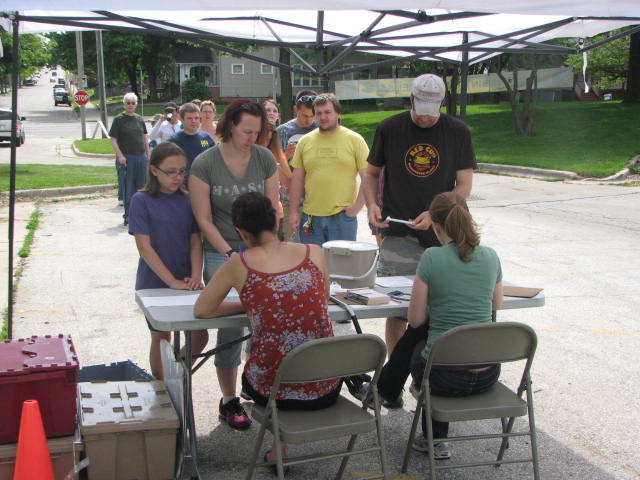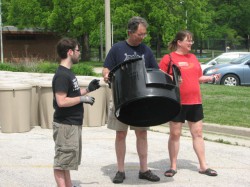Bargain Deals to Save the Environment
City works with Norseman Plastics to create low-cost rain barrels and compost bins.

Area residents line up to buy compost bins and rain barrels at discounted prices. (Photo by Patrick Leary)
Jesse Tobin wheeled her child around a parking lot in Washington Park on a recent weekend morning looking for a way to improve the way she composts food scraps.
“I have been looking for a compost bin and it’s a really good deal,” she said. “We currently compost, but this is a much better setup than we have.”
Tobin, a Martin Drive resident, was one of several hundred people from the Milwaukee area to purchase compost bins and rain barrels at a recent sale organized by Milwaukee’s Department of Public Works and Norseman Plastics, ltd.
Becky Curtis, a recycling assistant for Milwaukee DPW, coordinated the event with the help of Norseman representative Kelly Weidenfeller and volunteers from Rotaract Club of Milwaukee, a group of young professionals.
“We want people to come and buy the compost bins and rain barrels so that they can manage their organic waste at home on site and keep that out of the trash, and to use the rain barrels to harvest rain water and keep that from becoming run-off pollution and stress on the sewer system,” Curtis said.
A seven-year city employee, Curtis credited the sale’s success to the discounted prices. Instead of at least $100 for a compost bin or rain barrel, the items went for $45 and $55, respectively.
“It’s all about volume,” Weidenfeller said. “When someone sells it in a store, people are there not necessarily for just that, where when people come here, this is what they’re looking for specifically.”
Weidenfeller, who is from Minnesota, has travelled across the country for three years organizing similar events. The cities manage the advertising and Norseman sets up the sales and provides the equipment for discounted prices.
“There are sales where we sell out of them,” she said. “We can just fill up the truck and send out a ton of them.”
Curtis said that Washington Park provided an ideal location for the event, not only because of its convenient parking lot and central location, but because the surrounding neighborhood features plenty of yards, but not a lot of compost bins.
“The more people we can get on board that maybe haven’t been before, the better,” she said.
Convincing people to compost at home is especially important, since Milwaukee does not collect compost the way it does garbage and recycling. Additionally, Department of Public Works self-help centers accept yard waste during “leaf season,” but do not take in food scraps.
Daren Olson, a Riverwest resident, jumped at the chance to buy a discounted rain barrel.
“I really appreciate that water is a limited quantity,” he said. “I want to do my little part to get the water off the Milwaukee sewer system.”
The rainwater barrels also save the city and its residents money, according to Curtis.
“You save money on your water bill,” she said. “You can use water from your rain barrel to water your garden instead of from the tap. It’s expensive to treat that water and make it drinkable, and then use it for washing cars and putting on the plants.”
Tobin’s main purpose for attending was to benefit the community, she said.
“I convinced my neighbor to get one too,” Tobin added. “He’s a landscaper, and he wasn’t even composting, so I figure I’ve done a good deed in the world.”
Those kinds of good deeds can go a long way toward improving Milwaukee, said Phil Busch, a past president of Rotaract Milwaukee, as he helped carry the bins and barrels to customers’ cars.
“We’re looking to make Milwaukee as good a city as it can be, even better than it already is,” he said.
“This event helps people in our community, helps them save money, helps them have resources for their gardens, and that helps make Milwaukee better.”
This story was originally published by Milwaukee Neighborhood News Service, where you can find other stories reporting on fifteen city neighborhoods in Milwaukee.






















I use the rain barrels more as a buffer tank to direct water to rain gardens and a large Basswood tree. Another simple suggestion is disconnect downspouts from the storm drain or combined collection systems and direct ten feet away from the home to a garden or tree. Sometimes on narrow city lots, this is not possible. Compost piles also need occasional water to increase microbe, insect, and worm decomposition, and cool over-reactive hot spots that can kill off beneficial organisms.